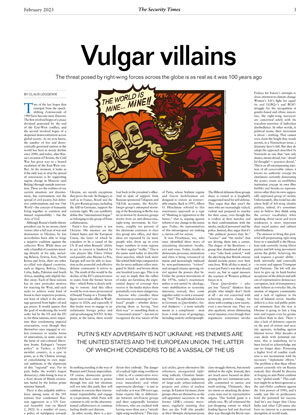Vulgar villains
 Credit: shutterstock/durantelallera
Credit: shutterstock/durantelallera The threat posed by right-wing forces across the globe is as real as it was 100 years ago
Two of the key hopes that emerged from the epoch-shifting Zeitenwende of 1989 have become mere illusions: The first involved hopes of a peace dividend generated by the end of the East-West conflict, and the second involved hopes of a deepened democratization across global society. As we now know, the number of free and democratically governed nations in the world has been in steady decline since 2000, and today, after Russia’s invasion of Ukraine, the Cold War has given way to a heated escalation of the East-West conflict. At the moment, it looks as if the only way to stop the spread of autocracies is by supporting regime change in Moscow (and Beijing) through outside intervention. These are the realities of our current situation: not disarmament, but rearmament; not the spread of civil society, but defensive confrontation; and not One World – the concept of humanity living together in common and mutual responsibility – but the Axis of Evil.
Although Russia’s battle-thirsty president can by no means claim victory after a full year of war and destruction in Ukraine, he has nevertheless been able to forge a negative coalition against the collective West. While there are only a handful of countries standing directly at his side, including Belarus, Eritrea, Iran, North Korea and Syria, there are other so-called non-aligned countries, such as Algeria, Bolivia, China, Cuba, India, Pakistan and South Africa, standing only slightly further away. Each of these nations has its own particular motives for rejecting the West, and each seeks to achieve some kind of boost to their respective position, not least of which is the advantage garnered from higher oil and gas prices. It would appear that the goal of weakening the world order led by the US and the EU is, for these nations, more important than condemning imperial annexation, even though they themselves once engaged in violent resistance to similar forms of annexation, in some cases in the form of anti-colonial liberation fronts. Erdogan’s “seesaw policy” in Turkey, a NATO member country, is a case in point, as is the Chinese strategy of consolidating its own imperial ambitions in the slipstream of this “regional” war. For its part, India, the world’s largest democracy, risks losing its way in a fever dream of Hindu extremism fueled by the Indian prime minister himself.
There is also palpable ambivalence among some of the 141 nations that condemned Russian aggression in a UN General Assembly vote on March 2, 2022. In a number of cases, a policy of indulgence towards Russia correlates with the rise of right-wing tendencies in democratic nations themselves. For the past two decades, Putin has been preparing for war by working on the domestic front to undermine the rule of law, obstruct free and fair elections, enforce conformity among independent media and strip science and art of authority. And it is precisely this ambition that drives his deceitful disinformation campaigns abroad, most importantly via social networks. The objective of these policies is to destabilize parliamentary institutions by means of right-wing (and to some extent also left-wing-populist) movements and parties. Governments such as that of Giorgia Meloni, the neo-Fascist Prime Minister of Italy, and Poland’s PiS party, both of which have sided with Ukraine, are merely exceptions that prove the rule. In Hungary as well as in France, Brazil and the US, pro-Russia groups, including the AfD in Germany, support the extreme right. We can justifiably define this “international league” as belonging to the group of Putin collaborators.
Putin’s key adversary is not Ukraine. His enemies are the United States and the European Union, the latter of which he considers to be a vassal of the US. If and when Brussels’ ability to act in concert is hindered by veto players like Viktor Orbán and possibly also Marine Le Pen, Europe will not be able to function as the powerful and effective defense community it strives to be. The result of this would be the decline of the EU’s attractiveness to states from the former Soviet bloc – which Putin is clearly seeking to restore. And this effect would be even more pronounced if Donald Trump or a Trump-like figure were to take office in Washington in 2024, and especially if this leader were to engage in an isolationist foreign policy and end up sabotaging NATO. At this point, at the latest, there would be nothing standing in the way of Russian and Chinese imperialism. Of course, democratic governments that have come to power through free and fair elections will not take this path; they will continue to exercise their international responsibility and engage in cooperation, while Putin will continue to rely on the aforementioned collaborators to continue fueling doubt and distrust.
In other words, there is a profound connection between Russia’s decision to wage war in Ukraine and the erosion of Western liberal democracies. This is not to argue that the gradual loss of legitimacy among liberal democracies is due entirely to some kind of external conspiracy; when democracies languish and die, it is usually primarily the result of some kind of internal fatigue or self-harm. It was not Putin alone who instigated the mob that stormed the US Capitol on Jan. 6, 2021; responsibility for that attack lies above all with Donald Trump, who sought to reverse his electoral defeat. And Russia wasn’t behind the attempted coup in Brazil two years later; that attack was almost entirely the work of Jair Bolsonaro’s unwavering followers, who sought to put that political lout back in the president’s office. And in spite of support from Russian-sponsored Telegram and TikTok accounts, the Reichsbürger group’s attempted storming of the Bundestag in Berlin was set in motion by domestic groups drawn from an anti-democratic, right-wing movement. In Germany, roughly ten percent of the electorate continues to elect this group into office, and their ideas are espoused by far more people who show up in even larger numbers in some regions for their regular “walks.” This is the name used today to describe these marches, which look more like school field trips compared to the far more militant rallies instigated by black- and brown shirts one hundred years ago. This is in no way to imply that the rallies of today are harmless; the exponential degree of coverage they receive in the media makes them potentially even more dangerous.
Anyone who classifies these movements as consisting of “confused” people – whether downplaying them as having “lost their way” or ennobling them as “concerned citizens” – has not yet recognized the true nature of the threat they embody. The danger of a radical right-wing overthrow – that is, of a conservative revolution rooted in anti-Semitism, toxic masculinity and white supremacist ideology – is just as real today as it was 100 years ago. Some experts like to differentiate between neo-Fascist groups and their supposedly harmless followers, who are credited with having more than just a “strictly right-wing worldview.” This may be true, but it can also be seen as presenting an even greater risk. The power of neo-Fascists lies in their cultural impact on a growing number of political nihilists who are not committed to any particular worldview and do not belong to any particular organization; instead, these individuals have an equally deep contempt for liberal modernity, democracy and its associated presumptions. Today, in an era marked by multiple concurrent crises – the pandemic, climate change, war, objectively justified fears of inflation and the loss of social status – we can feel the collective nervousness that has preceded all counterrevolutions in history. Faced with this long list of crises, right-wing groups engage in the mystification of the past in a manner similar to that of Putin, whose Stalinist regime and fascist mobilization are designed to restore an irretrievable empire. Back in 1991, Albert O. Hirschman referred to this reactionary approach as a type of “thinking in opposition to the future,” that is, arguing against reform or any change in the status quo. Today, the representatives of this intransigence are making a clarion call for action.
It was Hirschman, too, who once identified three ways of articulating discontent: loyalty, exit and voice. Today, loyalty to democratic processes, institutions and elites is being renounced en masse and increasingly replaced by non-parliamentary “exiters” and enraged citizens spewing vitriol against the powers that be. Unlike the protest movements of the 1970s, today’s reactionary milieu is not united by ideology, voter mobilization or economic interests; instead, they come together solely to emit a resounding “No!” The individuals known in Germany as Querdenker, (lateral thinkers) – a term initially meant as a compliment – stem from a wide array of groupings, including esoteric-anthroposophical circles, green-alternative life reformers, unorganized right-wing radicals, Christian fundamentalist sectarians, opponents of large-scale urban-industrial projects and critics of nuclear energy. In Eastern Germany, these groups often see themselves as the self-appointed successors to the former GDR’s citizens’ movement, regularly insisting that they are das Volk (the people) at their Monday demonstrations and PEGIDA marches.
The mindset of these groups is often based on a combination of conspiracy theories and racist or anti-Semitic leanings. The advent of the Covid-19 pandemic only bolstered their convictions; their deep skepticism and rejection of vaccine mandates even served to unite groups that were otherwise antagonistic toward one another. They bonded over their dislike of a powerful enemy – the state – which in their minds seeks only to rob people of their basic freedoms. The illiberal delusion these groups share is rooted in a laughably exaggerated need for self-defense. They argue that they aren’t the ones who are increasingly radical, violent and prepared to murder for their cause, even though this is evident at their marches and in their confrontations with the media, medical personnel and the police. Instead, they argue that it’s “the political powers that be,” ”science” and “the media” that are driving them into a corner. The slogan of the Brexiteers – a group that abandoned all reason – was “take back control,” with the idea being that British citizens should reclaim power over their own lives. With all this in mind, it is not just Putin’s war that should worry us, but in equal measure the reaction of Western political forces to it.
These Querdenker – who are less “lateral” thinkers than people who simply don’t think at all – are not concerned with achieving positive change, let alone with creating a new society, even a neo-fascist one. They are also apathetic about eliminating social injustice, even though their arguments sometimes invoke class-struggle rhetoric, but merely shifted to the right. Instead, they are much more focused on denigrating the very institutions actually committed to justice and truth-seeking. Ultimately, they are intent on attacking the democratic state and its representative organs. This foolish game is a tabula rasa. We all witnessed the jaw-dropping extent to which leading figures lied and deceived their way through the Brexit campaign, throughout the Trump presidency, and in the months following. Even worse, the leaders in this game don’t even deny their mendacity. But worst of all, their followers – fully aware of these lies – have only been emboldened to play foul themselves.
To be clear, reactionary groups do not operate with the declared intention of founding an autocracy. Still, they most certainly anticipate the emergence of such a state. And while the things they find fault in with regard to nepotism and the pains of democratic compromise usually contain a grain of truth, the members of these groups are in no way pursuing a project in the same way as other recent protest movements. For example, in contrast to Occupy’s efforts to tame the beast of finance capital, Fridays for Future’s attempts to draw attention to climate change, Women’s Lib’s fight for equality and LGBQ+’s and BLM’s struggle for the recognition of gender-based and ethnic minorities, the right-wing naysayers are concerned solely with the truculent assertion of individual disobedience. In other words, in political terms, their movement is about – nothing. They cannot even claim the height that would permit, in a Nietzschean sense, a dramatic hero’s fall. But they do adopt the approach described by Nietzsche as one that “not only denies, means denial, but – dreadful thought! ¬– practices denial.” This is an all-encompassing rejection of all conceivable values: it knows no authority (except the charlatans currently dominating the scene), trusts no established institution (except its own filter bubble) and brooks no representation other than its own supposedly oppressed group of victims. Unfortunately, this trend has also taken hold of left-wing identity politics; indeed, it’s sometimes easy to believe they think using the correct vocabulary when speaking about racist and sexist tendencies is more important than social justice and cultural colorblindness.
The mission to bring this powerful self-perpetuating right-wing force to a standstill is the Herculean task currently facing liberal parties and left-wing movements across the globe. Achieving this task requires a greater ability – both internally and externally – to resist and oppose Trumpism and Putinism. The left will also have to give up its hush-hushed acceptance of the defects and deficits of representative democracy: corruption, lack of transparency, state failures in everyday life, the anomie of migrant communities and a lack of vigilance in the face of Islamist terror. Another deficit is a clear and public political statement that the war in Ukraine is going to last a long time and require even far greater sacrifices than to date. There is also a lack of defensive capacity on the part of armies and security agencies, including against Islamist terror. After decades of cozy deals with potential enemies, this is something we’ve been forced to acknowledge and can no longer deny. Possessing a higher level of combat readiness is not inconsistent with the necessary “diplomatic efforts.” The problem is that these efforts cannot currently rely on Russia; instead, they should be directed at forging an anti-Putin coalition in the “global south.” This coalition might be as heterogeneous as the anti-Hitler coalition against the Axis powers of 1941, and it could, just like its predecessor, hold the potential for success. And let’s not forget that China, India and other G20-states also have no interest in a permanent disruption of world trade.
In the wake of our most recent epoch-shifting Zeitenwende of 2022, we harbor two great hopes that we simply cannot give up. The first is for the peace dividend that would emerge from our transformation to a sustainable global society that can work in unison to curtail climate change and species extinction and thereby find a way back to taking action in solidarity. The second hope is for the re-democratization of those autocracies and theocracies that have revealed their utter inferiority and incompetence with regard to key problems, as seen, for example, by China’s failure to contain Covid-19. We might even dare to hope that this kind of transformative change will extend into Russian society and bring it back into the community of peoples.
Claus Leggewie is the Ludwig Börne Professor at the Justus Liebig University of Giessen (JLU) and initiator of the JLU’s Panel on Planetary Thinking.



